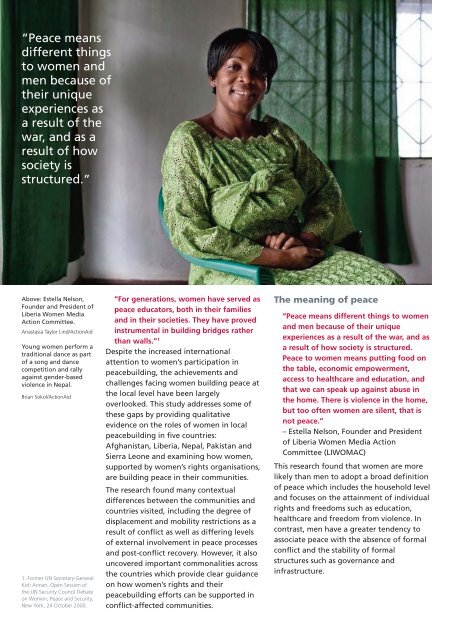From-the-ground-up_Womankind-and-ActionAid_FINAL
From-the-ground-up_Womankind-and-ActionAid_FINAL
From-the-ground-up_Womankind-and-ActionAid_FINAL
You also want an ePaper? Increase the reach of your titles
YUMPU automatically turns print PDFs into web optimized ePapers that Google loves.
“Peace means<br />
different things<br />
to women <strong>and</strong><br />
men because of<br />
<strong>the</strong>ir unique<br />
experiences as<br />
a result of <strong>the</strong><br />
war, <strong>and</strong> as a<br />
result of how<br />
society is<br />
structured.”<br />
Above: Estella Nelson,<br />
Founder <strong>and</strong> President of<br />
Liberia Women Media<br />
Action Committee.<br />
Anastasia Taylor Lind/<strong>ActionAid</strong><br />
Young women perform a<br />
traditional dance as part<br />
of a song <strong>and</strong> dance<br />
competition <strong>and</strong> rally<br />
against gender-based<br />
violence in Nepal.<br />
Brian Sokol/<strong>ActionAid</strong><br />
1. Former UN Secretary-General<br />
Kofi Annan, Open Session of<br />
<strong>the</strong> UN Security Council Debate<br />
on Women, Peace <strong>and</strong> Security,<br />
New York, 24 October 2000.<br />
“For generations, women have served as<br />
peace educators, both in <strong>the</strong>ir families<br />
<strong>and</strong> in <strong>the</strong>ir societies. They have proved<br />
instrumental in building bridges ra<strong>the</strong>r<br />
than walls.” 1<br />
Despite <strong>the</strong> increased international<br />
attention to women’s participation in<br />
peacebuilding, <strong>the</strong> achievements <strong>and</strong><br />
challenges facing women building peace at<br />
<strong>the</strong> local level have been largely<br />
overlooked. This study addresses some of<br />
<strong>the</strong>se gaps by providing qualitative<br />
evidence on <strong>the</strong> roles of women in local<br />
peacebuilding in five countries:<br />
Afghanistan, Liberia, Nepal, Pakistan <strong>and</strong><br />
Sierra Leone <strong>and</strong> examining how women,<br />
s<strong>up</strong>ported by women’s rights organisations,<br />
are building peace in <strong>the</strong>ir communities.<br />
The research found many contextual<br />
differences between <strong>the</strong> communities <strong>and</strong><br />
countries visited, including <strong>the</strong> degree of<br />
displacement <strong>and</strong> mobility restrictions as a<br />
result of conflict as well as differing levels<br />
of external involvement in peace processes<br />
<strong>and</strong> post-conflict recovery. However, it also<br />
uncovered important commonalities across<br />
<strong>the</strong> countries which provide clear guidance<br />
on how women’s rights <strong>and</strong> <strong>the</strong>ir<br />
peacebuilding efforts can be s<strong>up</strong>ported in<br />
conflict-affected communities.<br />
The meaning of peace<br />
“Peace means different things to women<br />
<strong>and</strong> men because of <strong>the</strong>ir unique<br />
experiences as a result of <strong>the</strong> war, <strong>and</strong> as<br />
a result of how society is structured.<br />
Peace to women means putting food on<br />
<strong>the</strong> table, economic empowerment,<br />
access to healthcare <strong>and</strong> education, <strong>and</strong><br />
that we can speak <strong>up</strong> against abuse in<br />
<strong>the</strong> home. There is violence in <strong>the</strong> home,<br />
but too often women are silent, that is<br />
not peace.”<br />
– Estella Nelson, Founder <strong>and</strong> President<br />
of Liberia Women Media Action<br />
Committee (LIWOMAC)<br />
This research found that women are more<br />
likely than men to adopt a broad definition<br />
of peace which includes <strong>the</strong> household level<br />
<strong>and</strong> focuses on <strong>the</strong> attainment of individual<br />
rights <strong>and</strong> freedoms such as education,<br />
healthcare <strong>and</strong> freedom from violence. In<br />
contrast, men have a greater tendency to<br />
associate peace with <strong>the</strong> absence of formal<br />
conflict <strong>and</strong> <strong>the</strong> stability of formal<br />
structures such as governance <strong>and</strong><br />
infrastructure.


